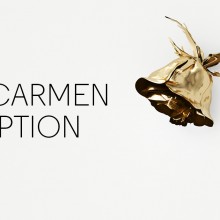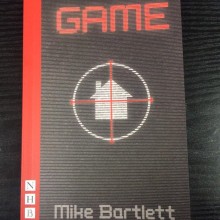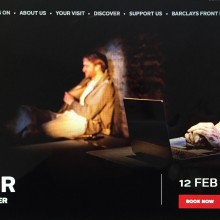
Theatre – 1984
Headlong’s stage version of the novel by George Orwell
The Almeida Theatre
The question that everybody has is how to translate George Orwell’s masterpiece of a frightening dystopian vision to the theatre. Enter the creative team of Robert Icke and Duncan Macmillan with their chilling stage adaptation and, as if to celebrate, this startling production appears 30 years after 1984.
The action is played out through the eyes of a book club group sometime after the supposed fall of The Party. The main characters are intact. Winston Smith trudges through his grim existence in a totalitarian state eradicating all memories of anyone who questioned The Party. He has the illicit affair with Julia and ends up being duped by O’Brien posing as a member of the rebel group, The Brotherhood. All well according to the original. But it’s the clever transformation of Orwell’s story, which makes this play innovative and memorable. First up is the almost Groundhog Day rendition of the lunchtime scenes depicting Winston and his colleagues. The character of Martin, pushing a trolley, chanting “victory gin” is amusing but also serves as a reminder of the monotony that exists in an oppressive regime.
The back of the stage is dominated by a huge video screen – upon which key parts of the play are performed. All of the scenes between Winston and Julia, in the secret room supposedly out of sight from Big Brother, are played out on this screen. The irony of this is wonderful but the overall use of film with stage is extremely imaginative because the audience becomes Big Brother. The climax of the play, in Room 101, is truly horrific. Although rats don’t actually appear the audience believes that the rodents could well have been on stage. As the torture scene unfolds memories surface of the lobotomy that Jack Nicholson underwent while playing Randle McMurphy in the 1975 film One Flew Over the Cuckoo’s Nest – another victim punished by the state.
The acting is excellent – both from the leads, Mark Arends and Hara Yannas playing Winston and Julia, and from the supporting roles – Christopher Patrick Nolan makes a particularly intimidating Martin. Tim Dutton, as O’Brien, is very convincing – first up pretending to be a sympathetic rebel and then as a truly menacing member of The Party. Indeed it is the final scene, between O’Brien and Winston, where Winston is thanking O’Brien that is both tender and deeply disturbing at the same time – those menacing moments of acceptance and reality linger in the viewer’s mind for some time.


